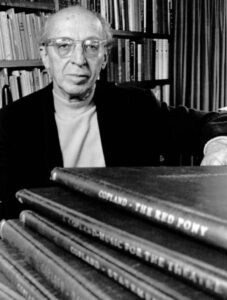
Visionary Composer
Aaron Copland (1900-1990) was a visionary composer whose contributions to American music are unparalleled. His distinctive style, often characterized by its incorporation of folk melodies, open harmonies, and rhythmic vitality, has come to symbolize the American musical landscape. Copland’s works such as “Appalachian Spring,” “Rodeo,” and “Fanfare for the Common Man” are celebrated for their ability to capture the spirit and ethos of America, resonating deeply with both audiences and critics.
Living Authentically
While never outspoken about his sexuality, Copland lived openly and authentically, forming meaningful relationships with talented men who moved in his cultural circles. Though he guarded his privacy and rarely spoke about his personal life, he was one of the few composers of his stature to live openly with his intimates. His relationships were well-known among friends and colleagues, and he never went to great lengths to hide them. Copland’s sexuality, though not widely discussed during his lifetime, was a significant aspect of his personal life and artistic journey.
Musical Brilliance and Resilience
Despite the societal challenges faced by LGBTQ+ individuals during his era, Copland’s sexuality did not hinder his success as a composer. His music, characterized by its emotional depth and innovative use of orchestration, became a cornerstone of American classical music. Works like his ballets “Billy the Kid” and “Appalachian Spring” are testaments to his ability to evoke vivid imagery and profound emotion through music. His contributions extended beyond composition; he was a conductor, writer, and advocate for contemporary music, helping to shape the American musical landscape in the 20th century.
